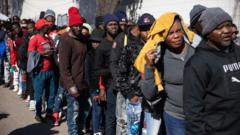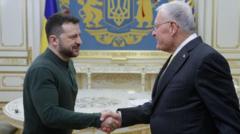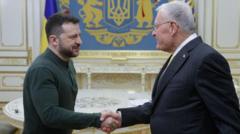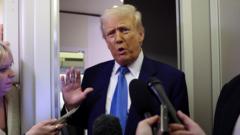As President Trump threatens tariffs on Europe, nationalist parties find themselves navigating a challenging landscape, torn between celebration and caution.
Trump's Tariff Threats: A Double-Edged Sword for Europe's Nationalists

Trump's Tariff Threats: A Double-Edged Sword for Europe's Nationalists
President Trump's proposed tariffs create a conundrum for European nationalist parties.
In a striking display of camaraderie, Italian Prime Minister Giorgia Meloni attended President Trump's recent inauguration, standing as the sole European leader present. Meloni, who aligns with many of Trump's conservative principles, hopes that her connection with the American president could amplify both Italy’s prominence and her political capital. Despite this alliance, an underlying tension exists between the aspirations of Europe's nationalistic factions and Trump’s protectionist rhetoric.
During his inaugural address, Trump emphasized, “I will, very simply, put America first,” vowing to implement tariffs and taxes on foreign nations to enhance American fortune. This statement immediately cast a shadow over the enthusiasm among Europe's right-wing movements. Trump's assurances regarding policy prioritization raise alarms for nationalist leaders across Europe who are themselves committed to putting their own nations first.
As Trump inches closer to following through on his tariff threats, nationalist parties find themselves in a precarious position. The very ethos they champion—national sovereignty and economic independence—could be significantly undermined by Trump’s America-centric policies. The potential economic repercussions of these tariffs could affect key constituencies that have bolstered nationalist movements, leaving leaders like Meloni to question whether their alignment with Trump will truly benefit their nations in the long run.
As the dialogue between America and Europe unfolds, the dynamics between America's tariffs and Europe's nationalist parties will remain a critical area of concern, shaping the political landscape in both regions.
During his inaugural address, Trump emphasized, “I will, very simply, put America first,” vowing to implement tariffs and taxes on foreign nations to enhance American fortune. This statement immediately cast a shadow over the enthusiasm among Europe's right-wing movements. Trump's assurances regarding policy prioritization raise alarms for nationalist leaders across Europe who are themselves committed to putting their own nations first.
As Trump inches closer to following through on his tariff threats, nationalist parties find themselves in a precarious position. The very ethos they champion—national sovereignty and economic independence—could be significantly undermined by Trump’s America-centric policies. The potential economic repercussions of these tariffs could affect key constituencies that have bolstered nationalist movements, leaving leaders like Meloni to question whether their alignment with Trump will truly benefit their nations in the long run.
As the dialogue between America and Europe unfolds, the dynamics between America's tariffs and Europe's nationalist parties will remain a critical area of concern, shaping the political landscape in both regions.






















